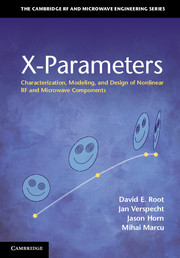Book contents
- Frontmatter
- Contents
- Preface
- Acknowledgments
- 1 S-parameters – a concise review
- 2 X-parameters – fundamental concepts
- 3 Spectral linearization approximation
- 4 X-parameter measurement
- 5 Multi-tone and multi-port cases
- 6 Memory
- Appendix A Notations and general definitions
- Appendix B X-parameters and Volterra theory
- Appendix C Parallel Hammerstein symmetry
- Appendix D Wide-band memory approximation
- Appendix E Solutions to exercises
- Index
- References
5 - Multi-tone and multi-port cases
Published online by Cambridge University Press: 05 October 2013
- Frontmatter
- Contents
- Preface
- Acknowledgments
- 1 S-parameters – a concise review
- 2 X-parameters – fundamental concepts
- 3 Spectral linearization approximation
- 4 X-parameter measurement
- 5 Multi-tone and multi-port cases
- 6 Memory
- Appendix A Notations and general definitions
- Appendix B X-parameters and Volterra theory
- Appendix C Parallel Hammerstein symmetry
- Appendix D Wide-band memory approximation
- Appendix E Solutions to exercises
- Index
- References
Summary
Introduction
In this chapter, the general X-parameter formalism is applied in two different cases of great practical interest beyond the simplest case of nearly matched components under large drive considered in Chapter 3. Specifically, X-parameter expressions are developed by spectral linearization around an LSOP defined by the DUT in response to two large incident signals, as opposed to the case of just one large signal considered in Chapter 3.
The first case is an example of two signals whose frequencies, f1 and f2, are the same, but are incident with distinct phases at different ports. This is an important subcase of a commensurate frequency relationship, namely f1/f2 = n/m for n and m integers. The second case considers incommensurate frequencies, where the ratio of the two signal frequencies is irrational. Whether or not the signals are commensurate affects the dimension of the LSOP as well as the form of the time-invariant X-parameter equations, as will be evidenced below.
- Type
- Chapter
- Information
- X-ParametersCharacterization, Modeling, and Design of Nonlinear RF and Microwave Components, pp. 112 - 149Publisher: Cambridge University PressPrint publication year: 2013
References
- 107
- Cited by

